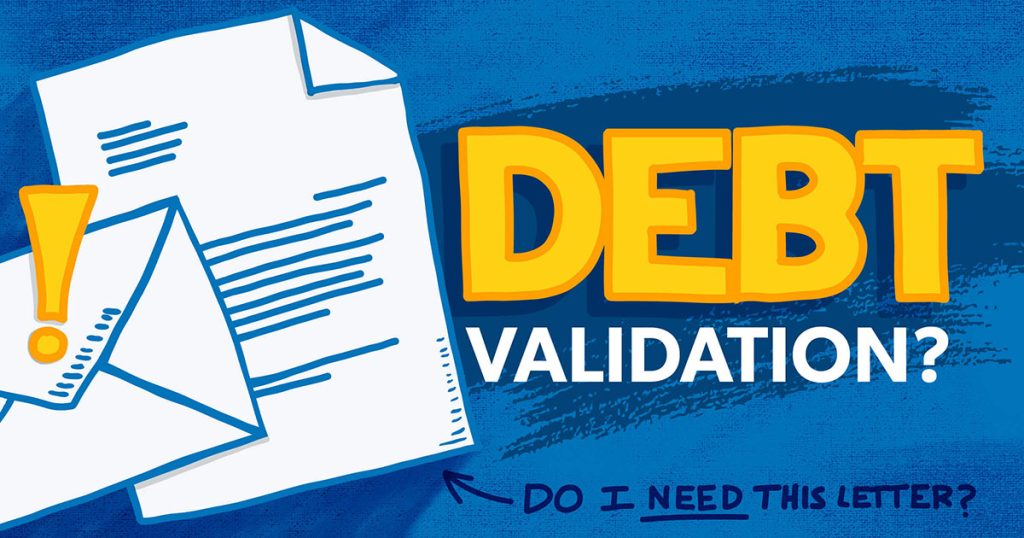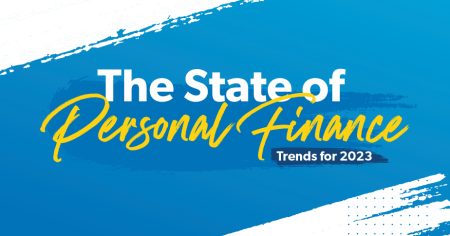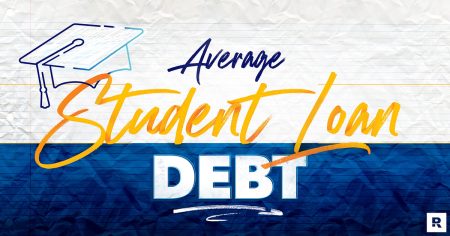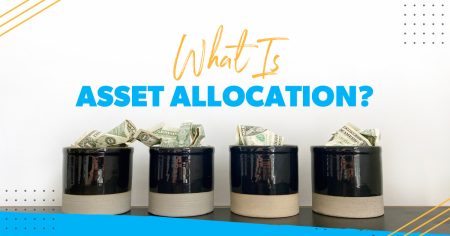Are you being hounded by debt collectors? The constant phone calls, harsh language and threats to sue can be overwhelming and downright scary.
Unfortunately, you also have to watch out for debt collectors who try to trick you into paying for a debt that’s already been paid or a debt that isn’t even yours. Yep, it happens!
In 2023, over 50% of the total complaints to the Federal Trade Commission were about debt collectors attempting to collect debt from a person who did not owe it.1 Not cool.
That’s why getting a debt validation letter is so important! A debt validation letter is basically a way to verify that a debt is legally yours to pay. And under federal law, a debt collector must provide it when you ask. So, let’s talk about how to get one.
What Is a Debt Validation Letter?
A debt validation letter is a document a debt collector sends you to prove that you owe them money. A debt validation letter should give the details of a specific debt, outlining exactly what debt you owe, who you owe it to, when you have to pay it by, and how to dispute it.
Legally, a debt collector must mail out a debt validation letter within five days of their first contact with you. If they don’t, you should ask for one. Why? Because it helps you know if the debt is actually yours or if they’re trying to pull a fast one on you. Remember, just because a phone call sounds official, it doesn’t mean it’s legit.
A debt validation letter should include:
- What creditor the collector is representing (aka who you supposedly owe money to)
- The amount you owe
- An opportunity to dispute the amount of the debt within 30 days (after that, the debt will be assumed valid)
- Confirmation that if you dispute the debt within 30 days, the debt collector or agency must provide written evidence of the debt within another 30 days
Know Your Rights: Why You Need a Debt Validation Letter
There are several reasons why a collector might contact you about a debt you have no memory of. Your debt could be so old that you forgot about it—aka zombie debt. Also, creditors sell outstanding debts to collection agencies all the time, so you may not recognize the name of the company contacting you.
On top of that, collection agencies don’t always have the best record-keeping skills. Mistakes happen and errors are common, so they could have the wrong name down as being liable for a debt. And even if it’s past the amount of time a creditor can legally come after you for a debt (aka the statute of limitations), they may still try to bully you into paying.
If you pay a debt without requesting a debt validation letter, you could:
- Pay money you don’t owe
- Revive debt that’s past the statute of limitations
- Fall prey to a debt collection scam (yikes!)
Again, always ask for a debt validation letter before you pay a collector!
How to Request a Debt Validation Letter
You should request a debt validation letter if you haven’t received one within 10 days of the debt collector first contacting you.
By Mail
If you know the debt collector’s mailing address, you can send them a written (preferably typed) letter via certified mail. (Be sure to ask for a return receipt—that way you’ll know, and have proof, they got your letter!)
By Phone
If you don’t know the debt collector’s mailing address, you can request a validation letter over the phone when they contact you. In that case, it’s a good idea to ask the collector if you can record the call for your records.
Debt Validation Letter Request Template
[Your name]
[Your return address]
[Date]
[Debt collector name]
[Debt collector address]
Re: [Account number (if you know it)]
Dear [debt collector name],
I am responding to your communication about a debt you’re trying to collect. You contacted me by [phone/mail] on [date] and identified the debt as [any information they gave you about the debt: amount, original creditor, etc.].
Please send the following information:
- The name and address of the original creditor, the account number and the amount owed
- Verification that there is a valid basis for claiming I am required to pay the current amount owed
- Details about the age and amount of the debt including a copy of the last billing statement from the original creditor
- A detailed explanation of any interest added or payments made since the last billing statement and the legal authorization for this interest
- The date the original creditor claims this debt became delinquent
- Whether this debt is within the statute of limitations and how that was determined
Please also forward details about your authority to collect this debt: Include whether you are licensed in my state, and if so, provide the date of the license, name on the license, license number, and the name, address and telephone number of the state agency issuing the license. If you are contacting me from outside my state, provide the licensing information from your state as well.
Thank you for your cooperation.
Sincerely,
[Your name]
What Happens After You Request a Debt Validation Letter
After a debt collector receives your request, they must stop all forms of communication with you until they’ve sent you a debt validation letter. That means no phone calls, no letters and no reporting your debt to any credit bureaus.
Once You Receive a Debt Validation Letter
After you receive your debt validation letter, read through it closely and make sure there are no errors.
If the debt really is yours, then you need to pay it off. Now, if your debt has been sold to a collections agency, you can try to negotiate a smaller payment. After all, collectors would rather get some money from you than none at all. (Just make sure you get all the details in writing!) Otherwise, see if you can work out a payment plan with your creditors.
But if you don’t think the debt is valid or if something still seems off, you can send a debt verification letter to dispute the debt. We know, that sounds very similar to a debt validation letter, but trust us, it’s different (more on that in a minute).
If the Collection Agency Fails to Validate the Debt
Under the Fair Debt Collection Practices Act (FDCPA), a debt collector must respond to a request for a debt validation letter. If they don’t, they’re in violation of the act. You can report them to your state’s attorney general, the Federal Trade Commission (FTC), or the Consumer Financial Protection Bureau (CFPB). You can also sue for up to $1,000.2
The main thing is to stay on your toes with these sketchy collectors. Keep copies of every single document and track all communications, including phone calls. Keeping a detailed record like this will help in case you need to report them.
How to Write a Debt Verification Letter to Dispute a Debt
Okay, so the collector sent you a debt validation letter, but something still seems fishy. Maybe you suspect you’re a victim of fraud or you know the statute of limitations has passed. Your next step would be to dispute the debt with a debt verification letter. (Again, this is different from a debt validation letter.)
The debt validation letter is the document you get from the debt collector outlining what you owe, who you owe it to, and important information about next steps. The debt verification letter is a letter you write and send to the debt collector, disputing the debt (if you truly don’t owe it or owe as much as the collector says you do).
|
|
Debt Validation Letter |
Debt Verification Letter |
|
Who sends it? |
Debt collector |
You |
|
What’s it say? |
Outlines the specifics of your debt |
Formally disputes the information in the debt validation letter |
|
How much time to send? |
Debt collectors are legally required to send one within five days of first contact |
You have up to 30 days after receiving a debt validation letter to send a debt verification letter |
In a debt verification letter, you should request the following information:
- Details about the original creditor
- How much you owe (based on a last statement or bill)
- The original loan agreement that proves the debt really belongs to you (like a signed contract)
- The age of the debt and the original delinquency date
- An itemization of any added fees and interest
- If the debt is past the statute of limitations
- The last action taken on the account
- Proof that the debt collector has the legal right and license to pursue this debt in your state
Remember, you have 30 days to respond to a debt validation letter with your debt verification letter. Otherwise, the debt is assumed valid and debt collectors can continue to contact you. Technically, you can still send a dispute after the 30 days are up, but until things are ironed out, you won’t be able to stop the collector from hassling you.
Send your debt verification letter via certified mail with a return receipt request so you have a record of your communication back to the collector.
Debt Verification Letter Template
Don’t know what to say to dispute a debt? Use this free template to write your own debt verification letter.
What Happens After You Dispute a Debt
If a debt collector can’t verify your debt, then they must stop contacting you about it. And they’re required to let credit bureaus know so they can remove the debt from your credit report. Don’t let this part slide! Keep checking your credit report until you see the change.
If the debt isn’t removed, you need to contact each of the credit bureaus (Experian, TransUnion and Equifax) directly and ask them to look into your case. Again, if the collector’s not playing by the rules, you should report them to your state’s attorney general, the FTC or CFPB.
Get the Debt Help You Need
When it comes to your debt, you have more power than you think! You can put collectors in their place and verify your debt before you pay a single dime. And if the debt actually is yours, you can pay it off—faster than you think.
Tackling your debt is a whole lot easier when you’ve got someone in your corner. A financial coach can help you defend yourself against debt collectors and give you a personalized plan to pay off any debt you owe.
You don’t have to do it alone! Talk to a Ramsey Preferred Coach for free.
Read the full article here










